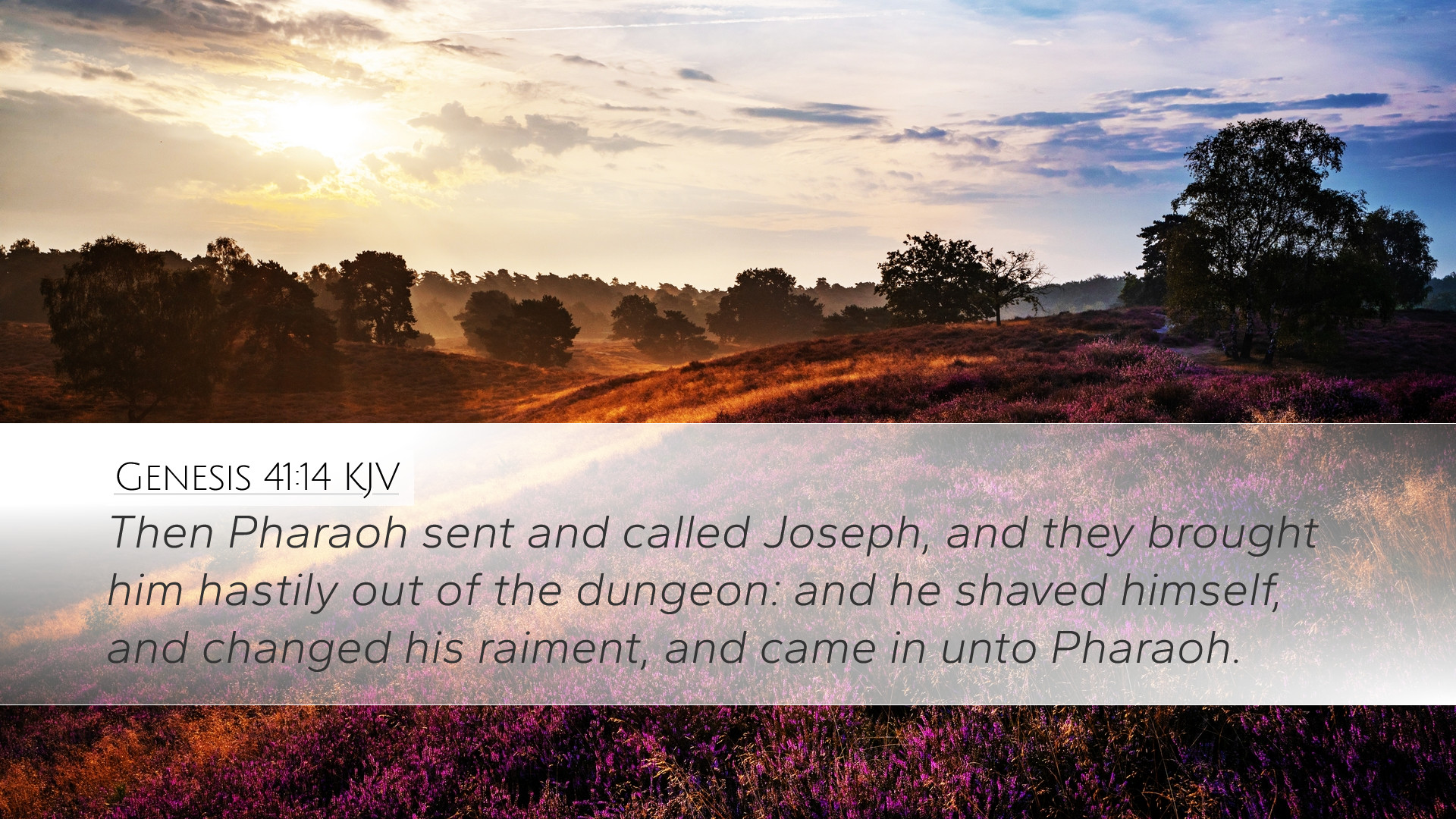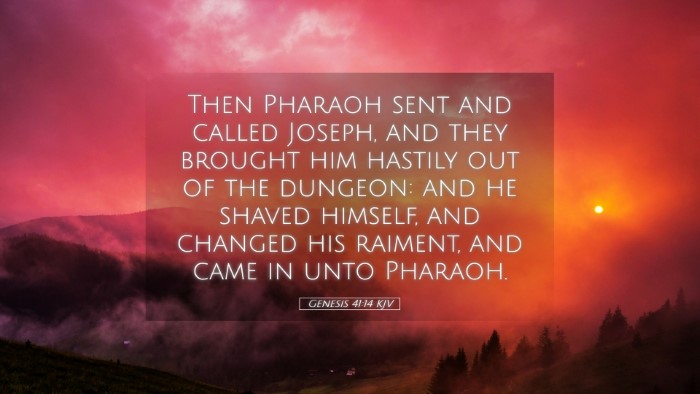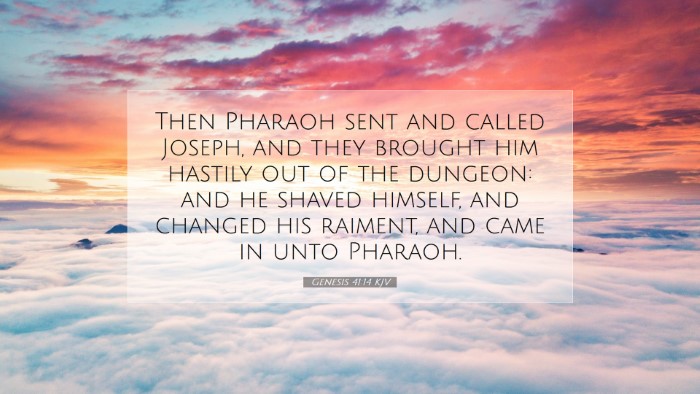Commentary on Genesis 41:14
Introduction
Genesis 41:14 is a pivotal verse within the narrative of Joseph's rise to power in Egypt. This moment marks a significant transition in Joseph's life from prisoner to confidant of Pharaoh, illustrating the theme of divine providence and the unfolding of God’s plan for His people. The verse states:
"Then Pharaoh sent and called Joseph, and they brought him quickly out of the dungeon; and he shaved, and changed his clothing, and came in unto Pharaoh."
Pivotal Context
This verse comes after Pharaoh experienced troubling dreams that none of his wise men could interpret. Joseph's interpretation of dreams, rooted in his ability to discern the divine message, is about to lead him to a place of prominence and responsibility. The hurried nature of Joseph's summons underscores the urgency with which Pharaoh seeks answers, highlighting both the severity of the situation and God's timing in Joseph's life. Below are insights drawn from noted public domain commentaries.
Insights from Commentators
Matthew Henry's Commentary
Matthew Henry emphasizes the providence of God at work in Egypt's perilous situation. He notes that God prepares Joseph in advance for this moment:
- The initiation of Joseph's ascent begins not merely with Pharaoh's commands but with God directing the circumstances towards His chosen servant.
- Henry highlights the swiftness of Joseph's removal from the dungeon, comparing it to God’s sudden intervention in delivering the faithful from their trials.
- Joseph's shaving and changing clothes symbolizes preparation and purification, reflecting an inner transformation as he transitions from prison garb to royal attire, signifying a change in status and purpose.
Albert Barnes' Notes on the Bible
Albert Barnes draws attention to the deeper spiritual implications of Joseph's encounter with Pharaoh:
- Barnes suggests that Joseph's being brought out "quickly" indicates God's immediate response to human need and distress. This reminder of God's faithfulness encourages believers to trust in divine timing during their own struggles.
- He points out that Joseph's interpretation of Pharaoh's dreams will not only save Egypt but also set in motion the fulfillment of God’s promises to Abraham, Isaac, and Jacob regarding the future of Israel.
- Barnes also muses on the significance of Joseph's appearance before Pharaoh; it is a representation of being ready for divine appointments. The actions taken by Joseph reflect the necessity of preparation when one is called into higher service.
Adam Clarke's Commentary
Adam Clarke provides an analytical approach, focusing on the historical and cultural context of the passage:
- Clarke notes the cultural practices surrounding the Egyptian court. Joseph's act of shaving and changing attire was customary for someone entering the presence of royalty, indicating respect and readiness.
- He articulates how Joseph's rapid elevation serves as a testament to God’s ability to elevate the humble and downtrodden, an enduring theme throughout scripture, reminding readers of the divine reversal of human fortunes.
- Clarke also emphasizes the immediate change in Joseph's fate. He went from a forsaken prisoner to a man of influence overnight, reflecting the drastic shifts that can occur under God's sovereign plan.
Theological Themes
Several key theological themes emerge from Genesis 41:14 that are vital for understanding the nature of God and His dealings with humanity:
- Divine Sovereignty: This verse encapsulates the overarching theme of God's sovereign plan, as Joseph's life story reveals. God orchestrates events not just for Joseph’s benefit, but as part of His purpose for the broader narrative of Israel.
- Preparation and Readiness: Joseph's preparation for his encounter with Pharaoh epitomizes the necessity for believers to be ready for the tasks God may call them to. This includes the intentional cultivation of character and gifts.
- Transformation: The act of shaving and changing clothes symbolizes the transformative power of God in a believer's life, highlighting the process of moving from despair to hope.
- Human Agency and Divine Intervention: While God is sovereign, He often works through human decisions and actions. Joseph's earlier response to the cupbearer's dreams was instrumental in leading to this moment, illustrating the interplay of faithfulness and divine opportunity.
Applications for Pastors and Theologians
This commentary offers profound applications for pastors, students, and theologians:
- Encouragement in Trials: Believers facing adversity can take comfort in knowing that God sees their plight and has a purpose for their struggles. Joseph's story reminds us to remain faithful in trials, as they may lead to greater roles in God’s plan.
- Readiness for Service: The necessity to prepare for opportunities in ministry cannot be overstated. Pastors and leaders should encourage congregants to cultivate their gifts and character in anticipation of divine appointments.
- Trust in Divine Timing: The urgency of Pharaoh’s request can remind church leaders and believers alike of the importance of waiting on God's timing, recognizing that interventions often come when least expected.
- Role of God in Leadership: Joseph’s rise to power emphasizes the necessity for leaders to maintain a relationship with God and recognize that their influence should ultimately reflect divine principles.
Conclusion
Genesis 41:14 serves not only as a turning point in the narrative of Joseph but as a profound lesson in God’s providence, preparation, and timing. By examining the insights of esteemed commentators, we gain a deeper understanding of the biblical text and its implications for faith and practice today.


